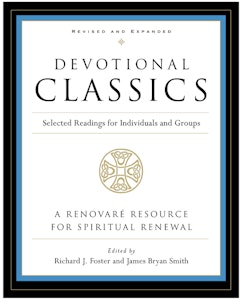Introductory Note:
I am endlessly moved by the writings of William Law because he so obviously believed in prayer and was so utterly committed to living out his faith in the ordinary junctures of daily life. He knew that true prayer never ends at the altar; rather it transforms the inner personality in such a way that we are enabled to love enemies and do good to all people. Prayer that does not profoundly affect daily life is not prayer at all but merely “lip labor” as Law himself put it.
This interpenetration of our spiritual life with our daily life is a winsome combination but one that I easily forget. My temptations are at the extremes: either I want to pray only and watch God act, or I want to go out and do it all myself Far too seldom do I enter the wonderful equilibrium that the old writers called ora et labora, prayer and work. I am grateful to William Law for reteaching me this valuable lesson—one that it seems I must learn repeatedly.
Richard J. Foster
Renovaré Founder
 Excerpt from Devotional Classics
Excerpt from Devotional Classics
1. A Life Devoted
Devotion is neither private nor public prayer, though public and private prayers are a part of devotion. Devotion signifies a life given or devoted to God.
The devout, therefore, are people who do not live to their own will, or in the way and spirit of the world, but only to the will of God. Such people consider God in everything, serve God in everything, and make every aspect of their lives holy by doing everything in the name of God and in a way that conforms to God’s glory.
We readily acknowledge that God alone is to be the rule and measure of our prayers. In our prayers we are to look totally unto him and act totally for him, and we must pray in this manner and for such ends as are suitable to his glory.
2. God the Rule and Measure
Now if we conclude that we must be pious in our prayers, we must also conclude that we must be pious in all the other aspects of our lives. For there is no reason why we should make God the rule and measure of our prayers, why we should look wholly unto him and pray according to his will, and yet not make him the rule and measure of all the other actions of our life. For any ways of life, any employment of our talents whether of our bodies, our time, or money that are not strictly according to the will of God, that are not done to his glory are simply absurdities, and our prayers fail because they are not according to the will of God. For there is no other reason why our prayers should be according to the will of God unless our lives may also be of the same nature. Our lives should be as holy and heavenly as our prayers. It is our strict duty to live by reason, to devote all of the action of our lives to God, to walk before him in wisdom and holiness and all heavenly conversation, and to do everything in his name and for his glory. If our prayers do not lead us to this, they are of no value no matter how wise or heavenly. No, such prayers would be absurdities. They would be like prayers for wings though we never intended to fly.
If we are going to pray for the Spirit of God, we must make that Spirit the rule of all our actions. Just as it is our duty to look wholly unto God in our prayers, so it is our duty to live wholly unto God in our lives. But we cannot live wholly unto God unless we live unto him in all the ordinary actions of our life, unless he is the rule and measure of all our ways, just as we cannot pray wholly unto God unless our prayers look wholly unto him.
3. Ridicule in the Life
This is the reason that we see such ridicule in the lives of many people. Many people are strict when it comes to times and places of devotion, but when the service and the church is over, they live like those that seldom or never come there. In their way of life, their manner of spending their time and money, in their cares and fears, in their pleasure and indulgences, in their labors and diversions, they are like the rest of the world. This leads the world to make light of those who are devout because they see their devotion goes no further than their prayers. When their prayers are over, they stop living unto God until the next time they pray. In between they live with the same attitudes and desires as other people. This is the reason why they are scoffed at by worldly people, not because they are really devoted to God, but because they appear to have no other devotion than their occasional prayers.
4. The Failure of Julius
For instance, there is a man named Julius who is very fearful of missing his prayers. Everyone in his church assumes Julius to be sick if he is not at church. But if you were to ask him why he spends the rest of his time playing games, why he spends the rest of his time with worldly people and worldly pleasures, why he is eager to engage in sinful diversion, why he engages in idle, gossiping conversation, or why he never puts his conversation, his time, and money under the rules of religion, Julius has no more to say for himself than the most disorderly person. For the whole tenor of Scripture lies directly against a life of debauchery and intemperance. One who lives in such a manner lives no more according to the religion of Jesus Christ than the person who lives in gluttony and intemperance.
If a person were to tell Julius that he cannot live that way and still remain a Christian, Julius would conclude that the person was not a Christian and reject his company. But if a person tells him that he may live as the rest of the world does, that he may enjoy himself as others do, that he may conform to the rest of the world and gratify his desires and passions as most people do, Julius would never suspect that such a person is not a Christian or that he is doing the devil’s work.
And yet if Julius were to read all of the New Testament from the beginning to the end, he would find his course of life condemned in every page of it.
5. The Great Absurdity
And indeed nothing more absurd can be imagined than wise, sublime, and heavenly prayers added to a life where neither work nor play, neither time nor money are under the direction of our prayers. If we were to see a person pretending to act wholly with regard to God in every thing that this person did and yet at the same time this person never prayed — whether public or private — wouldn’t we be amazed?
Yet this is the same thing as when one is very strict in devotion, being careful to observe times and places of prayer, and yet in the rest of one’s life — time, labor, talents, and money — completely neglects the will of God. It is as great an absurdity to offer up holy prayers without a holy life as it is to live a holy life without prayer.
Just as we cannot live a holy life without prayer, so we cannot have prayer without a holy life. To be foolish in the way we spend our time and money is no greater a mistake than to be foolish in relation to our prayers. If our lives cannot be offered to God, how can our prayers?
6. Rules for Daily Life
The simple point is this: either Christianity prescribes rules to live by in our daily lives, or it does not. If it does, then we must govern all our actions by those rules if we are to worship God. For if Christianity teaches anything about eating and drinking, spending our time and money, how we are to live in the world, what attitudes we are to have in daily life, how we are to be disposed toward all people, how we are to behave toward the sick, the poor, the old, and destitute, whom we are to treat with particular love, whom we are to regard with a particular esteem, how we are to treat our enemies, and how we are to deny ourselves, we would be foolish to think that these teachings are not to be observed with the same strictness as those teachings that relate to prayer.
It is very observable that there is not one command in all the gospel for public worship. One could say that it is the duty that is least insisted upon in Scripture. Frequent church attendance is never so much as mentioned in all of the New Testament. But the command to have a faith which governs the ordinary actions of our lives is to be found in almost every verse of Scripture. Our blessed Savior and his Apostles were very intent on giving us teachings that relate to daily life. They teach us: to renounce the world and be different in our attitudes and ways of life; to renounce all its goods, to fear none of its evils, to reject its joys, and have no value for its happiness; to be as newborn babes who are born into a new state of things; to live as pilgrims in spiritual watching, in holy fear, and heavenly aspiring after another life; to take up our cross daily, to deny ourselves, to profess the blessedness of mourning, to seek the blessedness of poverty of spirit; to forsake the pride and vanity of riches, to take no thought for the morrow, to live in the profoundest state of humility, to rejoice in worldly sufferings; to reject the lust of the flesh, the lust of the eyes, and the pride of life; to bear injuries, to forgive and bless our enemies, and to love all people as God loves them; to give up our whole hearts and affections to God, and to strive to enter through the straight gate into a life of eternal glory.
Isn’t it strange that people place so much emphasis upon going to church when there is not one command from Jesus to do so, and yet neglect the basic duties of our ordinary life which are commanded in every page of the Gospels?
7. Walking the Talk
If self-denial is a condition for salvation, all who desire to be saved must make self-denial a part of everyday life. If humility is a Christian duty, then the everyday life of a Christian must show forth humility. If we are called to care for the sick, the naked, and the imprisoned, these expressions of love must be a constant effort in our lives. If we are to love our enemies, our daily life must demonstrate that love. If we are called to be thankful, to be wise, to be holy, they must show forth in our lives. If we are to be new people in Christ, then we must show our newness to the world. If we are to follow Christ, it must be in the way we spend each day.
From Devotional Classics, edited by Richard Foster and James Bryan Smith (HarperCollins, 2005). Used with permission. A Serious Call to a Devout and Holy Life was first published in 1729. This excerpt is from the 1978 Paulist Press edition.
Text First Published December 1977


